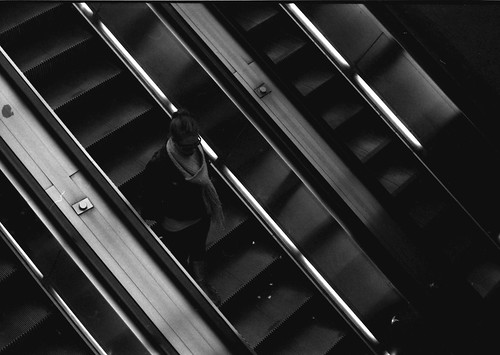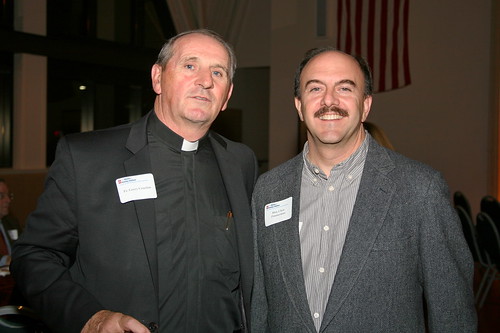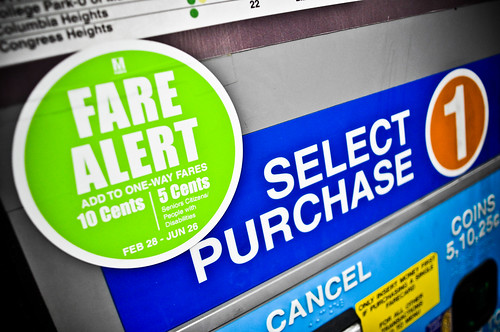
‘Gakkenflex’
courtesy of ‘pnzr242’
As you might have heard by now, Metro’s longest serving board member, Chris Zimmerman, has elected to step down. I spoke with Mr. Zimmerman this morning about his decision to step down, and about Metro in general.
Despite the persistent reports that he resigned due to frustrations with funding, Zimmerman told me that he stepped down because of time constraints. At the beginning of the year, Zimmerman will become chairman of the Arlington County board. “I have a number of things in Arlington that are very important to me that I really need to spend time on,” he said. “The Metro assignment has become quite consuming, and at some point you have to decide what to focus on.”
That doesn’t mean he isn’t concerned with Metro’s funding. “My concern about Metro in the future is that we have not been committing the resources necessary to operate at the level that the region expects, and we’re seeing the consequences of that. That’s not something that can be fixed from within the Metro board.” He adds that he expects to continue to be involved in Metro and other transportation issues, and in finding a stable source of funding for the agency.
Read on for what I thought was a frank and wide-ranging discussion of the issues the board and the region have ahead of them.

‘Into the Darkness III’
courtesy of ‘yonas1’
“It’s a chronic problem. We’ve been facing it for a long time, we’ve been talking about it for a long time,” he says of Metro’s funding. “These are not things that are going to be fixed by a magical general manager. They’re not going to be fixed by any configuration of the board of directors.
“If we really want this thing to work, we have to get serious as a region and commit the investment to it that’s necessary to maintain it at the level people want to maintain it and to operate it at the level they expect.”
Metro, Zimmerman says, is core to the local economies and it is those local jurisdictions that have to step up and help pay for the service. “It’s not just another amenity, it’s actually a core service. It’s something that is key to the vitality of the local economy that generates the revenue that pays for everything else, therefore it has to be given a certain primacy. If it’s necessary to come up with more money, even when you’re cutting other things, then yes, you have to come up with it. Because this is the seed corn.”
He says that Northern Virginia’s local governments came up with extra funding during the budget crunch earlier in the year. “The choices were cut service, raise fares, or come up with additional subsidies, and it was the Northern Virginia local government that said, ‘okay, we’re willing to go half way, even though that means raising taxes in our jurisdictions.'”
“The biggest resistance was from Maryland, and the District wasn’t particularly great, either, frankly.” He continues, “I think that’s just a matter of who’s closest to the system, who’s closest to the riders. The local governments […] are willing to step up to the plate. The problem when you have it at the control of the state level, it just gets lost in lots of other priorities.”

‘2nd Annual Ellen Bozman Affordable Housing Award’
courtesy of ‘cliff1066â�¢’
His frustration with the situation is quite palpable. “I am concerned that we were forced to raise fares so high this year because of the unwillingness of government at the state level basically to provide any additional funding.”
“The only alternative was to raise the fare or slash the service, and I thought slash the service was the worst thing we could do. But we definitely raised fares a lot more than I thought we should be doing. So far it’s not clear that it’s so expensive that people can’t afford it, but obviously it has an impact.
“We, frankly, should be incentivizing transit use. We’ve done a fair amount of that. We’ve been increasing ridership tremendously. We’re ahead of every other place except for New York in the country on transit ridership, and it has been growing. This could wind up being the first year it doesn’t grow, but the combination of a recession and a significant fare hike presumably will have some impact.
“My concern mostly, though, is what will happen next year? With the continuing recession and the impact it is having on budgets, if the board faces the same choice we had last year — a big gap and what to do about it — if there’s no more willingness again to put up additional funding from the governments, then they are going to face the same kind of choice, and it’s going to be much harder to raise fares.
“I definitely think we’ve raised them as much as they can safely be raised in the short term, and I don’t see how that’s much of an option for this year’s budget. So you’re going to be looking at cutting service. Do governments want to see services cut, or are they going to be willing to put up any additional funding to meet the needs.”
Yeah, that sounds like we (as in the people) need to start calling our state representatives and making sure that Metro gets additional funding. It isn’t going to be easy, of course, but as Zimmerman said earlier, Metro is vital to the region. We can’t afford to have worse service than what we put up with now.
On proposed changes to the Metro board, Zimmerman says the talk is a bit of a distraction. “I think that mostly what people are looking for is anything to change so they can change something that doesn’t involve the actual pain of having to pay for it. I think that’s the real problem we have right now: It’s one distraction after another.”

‘Thirty #112’
courtesy of ‘Chris Rief aka Spodie Odie’
We spoke a bit about what can be done for long term planning and not just at Metro. “We need to use the existing infrastructure more efficiently. You can move a lot more people on the road network that we’ve got if you put them in transit vehicles and if you give transit priority.”
“We need to do things like use ‘bus on shoulder’ on our highways, something that Minneapolis has a couple of hundred miles of, and queue jumpers at intersections, and signal priority, and dedicated lanes on the streets, and then you can move lots of people. If we build the street car – light rail networks that are on the books now, [if we build] the purple line, those things all can add tremendous capacity to the region, but we have to invest in them.”
And that’s the rub, really. Zimmerman says that if we don’t have the willingness to fix and improve the existing systems, getting money for other improvements is going to be very difficult.
“I pushed real hard for years to get 8-car trains. We’re at maybe 20-25%, at best, 8-car trains in the peak time. We were supposed to be at 50% by now. The inadequate funding combined with the things that have to be done to respond to the NTSB is pushing all that out.
“Our number one concern should be how we get the most out of the system, how do we get to actually taking advantage of the design capacity? That means more rail cars, and it means more operating funds. We can do that, and we can add a few hundred thousand riders a day, and that’s not insignificant.
“But we have to be willing to pay for it. We’re not willing to pay for the system we have now, it’s hard to talk about adding new capacity.”
While Zimmerman paints a less than rosy picture about the future of Metro, I don’t get the feeling that he’s quitting to send a message or out of frustration. He’s very passionate about the system and about transit, and he’s not dropping out lightly. He’s even got his replacement ready to go, and has already picked out his replacement from Arlington’s board. Mary Hynes will be taking over the reigns, and Zimmerman feels she’s more than qualified for the position, and that she’s suited to that work.
As an Arlington resident (shh, don’t tell the We Love DC editors), I’m sorry to see Zimmerman step down. In my mind, he was arguably one of the best on the board, and certainly one of the more passionate members. I’m hoping Hynes will be able to fill his shoes, and I’m glad we’ve still got him fighting the good fight.
It’s funny how all you hear about is that there are only 2 options cut service or increase funding. Almost never does anyone talk about how the unionized workforce needs to be restructured. More and more pay and benefits for less and less work is eventually a dead end street. The unions need to start paying for more of their benefits just like everyone in the private sector has had to do. The management has to be given the full authority to fire people as needed to reduce poor performers. Benefits need to be reduced so that they are on par with cost effective companies. These things should be accomplished before we send more money down the black hole we call metro.
Pingback: Morning Notes | ARLnow.com
“I am concerned that we were forced to raise fares so high this year because of the unwillingness of government at the state level basically to provide any additional funding.”
I take extreme exception to this quote. There was a new $300 million infusion from the states/DC and the Federal Government this year, and that commitment is in place for the next ten years.
By contrast, Zimmerman’s streetcar plan for Arlington has a budget estimate of around $160 million. That’s to come out of the ground and provide an entire streetcar line on Columbia Pike from scratch.
Don’t say nobody gave you (and Metro) money, Chris. Just admit to your greed for more more more money.
Zimmerman is a douche nozzle. Good riddance.